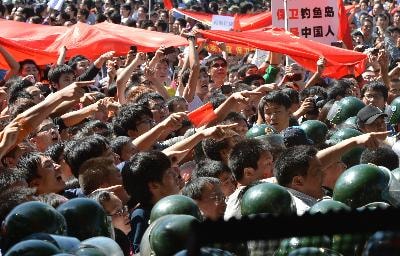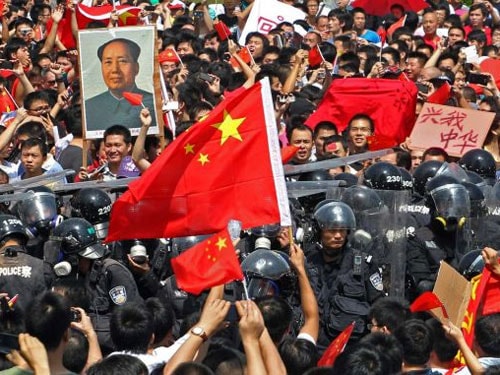Chinese newspaper changes tone after anti-Japan protests
In less than a week, the Chinese press has changed its tone continuously when reporting on the Senkaku/Diaoyu Islands dispute with Japan, from saying "Japan will pay a heavy price" to saying "vandalism during protests is illegal".
NewspaperFlower Post Office
NewspaperBeijing YouthOn September 15, the newspaper wrote that the vandalism of Japanese-made cars seriously violated Chinese law. “A line must be drawn here. Showing patriotism should not affect public order and should not go beyond the legal framework,” it said.

Anti-Japan protests in China are spiraling out of control......although Xinhua News Agency asserted that the overall picture was still of "peaceful protests". Photo: AP.
Nationalism is being used as a cover to cover up acts of vandalism and looting. Photo: Apple Daily
Commentary posted on September 16 byXinhua News Agencycalled on the Chinese people to “show patriotism wisely.” Then, on September 17,Xinhua News Agencyasserted that “destructive acts during protests are not a common phenomenon” and that the overall picture remains one of “peaceful protests.”
SheetPeople's Daily, the mouthpiece of the Communist Party of China, also criticized the illegal actions that have embarrassed the Chinese legal system and society, and may also cause international criticism of China.
Xinhua News Agencyalso contributed with some editorials threatening that “Japan will pay a heavy price”. Not to mention some media outlets in this country have called for preparations for military action to assert sovereignty over Diaoyu/Senkaku.

Chinese press criticized vandalism and looting during protests as illegal....but Xinhua News Agency said it was just an uncommon action. Photo: Reuters
This change in tone was assessed by Professor Trien Giang, a journalism lecturer at the China Foreign Affairs Academy, as "hypocritical" because the press itself had incited nationalism in the country and then turned around to call on people to be calm and restrained.
Named asGlobal Times, an edition of the People's Daily. Professor Trien Giang accused the newspaper of conspiring with "hawkish" generals to manipulate the patriotism of the Chinese people to serve their own interests.
Meanwhile, some other scholars warn that the Chinese government should not underestimate the protests and the risk of blind nationalism. Professor Yuan Weishi, a history expert at Sun Yat-sen University in Guangzhou, commented: "There would not have been spontaneous protests across China without the government's tacit approval. This has put the Chinese leadership's ability to manage international relations and control domestic tensions to the test."
Professor Chuc Lap Gia fears that if violent protests continue, China will be at a disadvantage in resolving disputes with Japan.
According to Nguoilaodong-M






